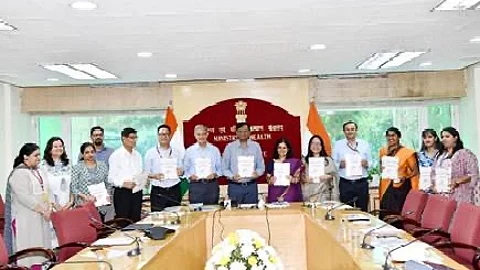

The Union Health Ministry today unveiled revised Operational Guidelines and a Training Module for Non-Alcoholic Fatty Liver Disease (NAFLD) aimed at enhancing patient care and outcomes through evidence-based practices. The documents emphasize early detection, prevention, and multidisciplinary care to combat NAFLD, a rapidly growing public health concern linked to metabolic disorders like obesity, diabetes, and cardiovascular diseases.
Shri Apurva Chandra, Union Health Secretary, acknowledged India's leading role in addressing NAFLD as a significant non-communicable disease (NCD). He emphasized that NAFLD is becoming a widespread issue, with a prevalence of 10-30% in the population. "NAFLD is emerging as a major public health threat, directly linked to metabolic diseases. One in every three individuals could be affected," he said.
The revised guidelines highlight the government’s commitment to mitigating the disease, providing a structured framework for healthcare providers at all levels, from community health workers to medical officers. Shri Chandra stressed the importance of early intervention and lifestyle changes, underlining the need for a continuum of care for those diagnosed with NAFLD and related NCDs.
Smt. Punya Salila Srivastava, Officer on Special Duty, Union Health Ministry, added that the guidelines must reach grassroots health workers to facilitate early detection, crucial for controlling NAFLD. She also noted that the release of the training module would significantly enhance India's healthcare capacity in tackling the rising NCD burden.
Dr. S.K. Sarin, Director of the Institute of Liver and Biliary Sciences (ILBS), commended the release of the documents, predicting a notable impact on public health in the coming years. He pointed out that many NCDs, including diabetes, heart disease, and cancer, are closely linked to liver health, emphasizing the importance of preventive care.
Non-communicable diseases account for over 66% of deaths in India and are often tied to behavioral risk factors like tobacco use, poor diet, lack of physical activity, and air pollution. NAFLD, in particular, is emerging as a silent epidemic, with its prevalence in the community ranging from 9% to 32%, depending on demographic factors such as age, gender, and socioeconomic status.
Recognizing the gravity of the situation, India became the first country to integrate NAFLD into its National Programme for Prevention and Control of NCDs in 2021. The newly revised guidelines aim to further strengthen these efforts by equipping healthcare professionals with the necessary knowledge and skills to identify, manage, and prevent NAFLD, particularly at the primary healthcare level.
The training module covers a wide range of topics, from the epidemiology of NAFLD to risk factors, screening, diagnostic protocols, and standardized treatment guidelines. It also emphasizes the importance of early detection, patient education, and lifestyle modification in improving outcomes.
The release of these documents underscores the Ministry’s commitment to a multidisciplinary approach, encouraging collaboration across various healthcare disciplines to provide holistic care for individuals affected by NAFLD.
Senior officials from the Union Health Ministry, representatives from all 36 States and Union Territories, and experts from WHO, ILBS, AIIMS, and other leading institutions attended the meeting, reflecting broad support for the initiative.
(Input from various sources)
(Rehash/Ankur Deka/MSM)
